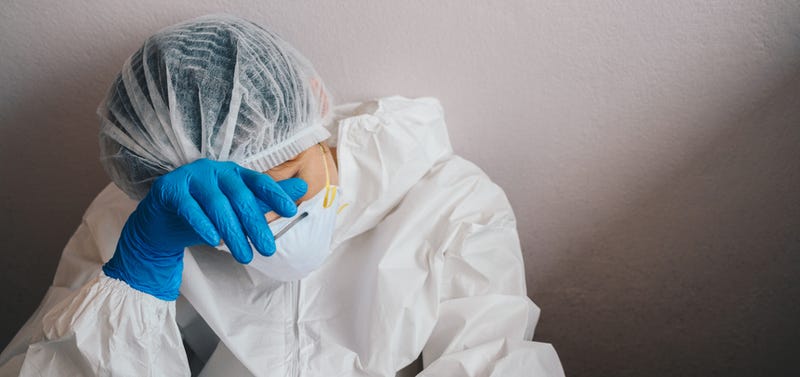
Health officials are pleading with people to get vaccinated as the mental health of frontline workers takes a serious dive.
When case numbers started soaring the first time around, the effect on frontline workers made headlines across the country. People were going out of their way to help: Skylines were lighting up blue, restaurants were providing essential workers with free meals, people were standing outside and clapping for them, etc. As the pandemic stretches on, those gestures are becoming less common. But the strain on frontline workers hasn’t gone away. If anything, MedStar’s Matt Zavadsky says … it’s gotten worse.
"It is much more mentally straining for the healthcare workers now than it was a year ago," Zavadsky says. "The volumes are as high if not higher, the risks are as high if not higher."
Zavadsky says the understanding that this surge was preventable makes things doubly disappointing for first responders. "It could have been easily prevented if people had taken some of those steps like vaccines and mandatory masks," he says. "[The pandemic] has been going on for so long. You've got the time fatigue as well as the volume fatigue, and people are just worn out."
Additionally, frontline workers are battling more than COVID-19. They're fighting staffing shortages caused by the virus, as well. When they get sick, Zavadsky says their coworkers are forced to step up, take extra shifts and longer hours. He says this is just one more way the surge is wreaking physical and emotional havoc on first responders.
The best way people can help first responders right now is by getting vaccinated, Zavadsky says. But there's something else they can do, too:
"When you see a police car, a firetruck, an ambulance-- or you see a nurse in scrubs or a doctor who's dragging themselves home after a long shift-- just wave. Thank them for what it is that they're doing," he says. "So often people don't do that, and it's those little things that really matter."
LISTEN on the Audacy App
Sign Up and Follow NewsRadio 1080 KRLD

